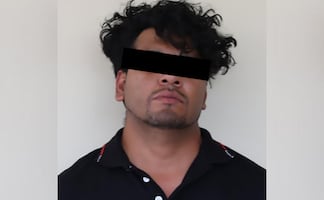Más Información

Morena en San Lázaro cierra filas con Claudia Sheinbaum por reforma electoral; Monreal reconoce que no hay acuerdo con aliados

Gurría Treviño, salario mensual equivalía al de dos presidentes de México; se jubiló a los 43 años con jugosa pensión

Familiares del matrimonio poblano asesinado exigen agotar todas las líneas de investigación; "no descansaremos hasta obtener verdad y justicia"

Cae jefe operativo del CJNG, junto a 13 presuntos secuestradores en Veracruz; liberan a una persona privada de su libertad

Investigan desaparición del hijo del exsenador Jorge Luis Preciado tras localizar su auto calcinado; revisan cámaras de la zona
A group of researchers, led by a Mexican scientist , discovered a vulnerability of the Spike protein of the SARS-CoV-2 coronavirus that will allow the development of a treatment against COVID-19 .
Scientists from the University of Northwestern found that the protein also known as “S,” which is responsible for allowing the virus to join human cells, has a place known as the polybasic cleavage site that has a positive charge and that creates a strong union with human cells, which have a negative charge.
From these results, the researchers focused on designing a negatively charged molecule to join the positively charged union site in order to produce of block that prevents the virus from joining the host cell, as mentioned in Phys.
“Our work shows that blocking this cleavage site can act as a feasible prophylactic treatment that reduces the virus capacity of infecting human beings,” said Mónica Olvera de la Cruz, the Mexican scientists who led the research.
Recommended:
In this research, the mutations of the SARS-CoV-2 Spike protein affected the transmission of the virus thanks to the amino acids that comprise it and that are located in cleavage sites, which are highly infectious and essential for the transmission of the virus.
Olvera de la Cruz and Baofu Qiao, assistant professor of the investigation, discovered that the polybasic cleavage site is located 10 nanometers away from the human cell receptors, a surprising discovery.
“We were not expecting to see electrostatic interactions at 10 nanometers,” said Qiao. “In physiological conditions, all electrostatic interactions do not take place in distances over 1 nanometer,” said the expert.
For her part, Olvera de la Cruz asserted that the cleavage is a fundamental factor for contagion for it seems that the virus gets attached with the furin enzyme, which is found in the lungs, “which suggest the cleavage site is crucial for the entrance of the virus into human cells.”
Due to these new discoveries, the scientists are planning to add to their research the collaboration of pharmacologists from the University of Northwestern to design a new drug that can join the Spike protein.
Olvera de la Cruz majored in Physics by the National Autonomous University of Mexico (UNAM) in 1981 and got her Ph.D. at the University of Cambridge in 1985. Born in Mexico City, the expert is focused on the development of self-assembly models of heterogenous molecules, that is, recovering them from a planned distribution.
It was in 1986 when she joined the University of Northwestern, where she has done her most recent discovery regarding SARS-CoV-2 and where also teaches Materials Science, Materials Engineering, and Chemistry.
She has been able to share her experience in other study centers for she has also worked in universities like Princeton and has been part of specialized agencies like the Advisory Committee for Mathematical and Physical Sciences National Science Foundation (NSF) and the Committee for Solid State Science of the National Investigation Council, as well as the Editorial Board of macromolecules of the Journal of Polymer Science B: Polymer Physics.
Recommended: The global scientific and technological challenges for COVID-19 vaccine development
Her contributions to science have been significant for they have been useful for the development of new research fields of technological relevance, such as the case of the dynamics of gel electrophoresis to split molecules, as well as the self-assembly of heterogeneous molecules in complex nanostructures, one of the methods through which they found SARS-CoV-2 has a polybasic cleavage site that enables the virus to attach to the human body.
The doctor has been recognized with science scholarships, has been selected as a member of the American Philosophical Society in 2020, and was appointed distinguished professor by the National Science Foundation in 2013.
Moreover, she won the American Physical Society’s Award to Polymer Physics in 2017, the National Academy of Sciences Cozzarelli Award in 2007, and the 1990-95 Young Researcher Award of the NSF.
In addition to having publishing multiple articles, Olvera de la Cruz has directed educational programs and has taught different subjects in prestigious schools.
She is currently an international scientific counselor that works with countries like Spain and Germany. Moreover, she is the director of the Center for Computation and Theory of Soft Materials and is the deputy director of the Center for Bio-Inspired Energy Science.
mp
Noticias según tus intereses
[Publicidad]
[Publicidad]









